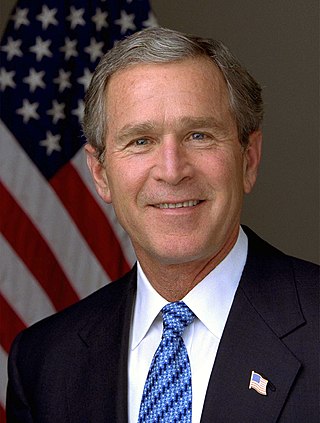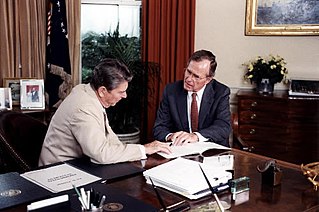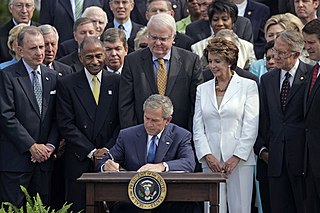
George W. Bush's tenure as the 43rd president of the United States began with his first inauguration on January 20, 2001, and ended on January 20, 2009. Bush, a Republican from Texas, took office following his narrow Electoral College victory over Democratic incumbent vice president Al Gore in the 2000 presidential election, in which he lost the popular vote to Gore by 543,895 votes. Four years later, in the 2004 presidential election, he narrowly defeated Democrat nominee John Kerry, to win re-election. Bush served two terms and was succeeded by Democrat Barack Obama, who won the 2008 presidential election. Bush is the eldest son of the 41st president, George H. W. Bush.
A pocket veto is a legislative maneuver that allows a president or other official with veto power to exercise that power over a bill by taking no action, thus effectively killing the bill without affirmatively vetoing it. This depends on the laws of each country; the common alternative is that if the president takes no action a bill automatically becomes law.
The National Do Not Call Registry is a database maintained by the United States federal government, listing the telephone numbers of individuals and families who have requested that telemarketers not contact them. Certain callers are required by federal law to respect this request. Separate laws and regulations apply to robocalls in the United States.

Diana Louise DeGette is an American lawyer and politician serving as the U.S. representative for Colorado's 1st congressional district since 1997. A member of the Democratic Party, her district is based in Denver. DeGette was a Chief Deputy Whip from 2005 to 2019 and is the dean of Colorado's congressional delegation; she served as the Colorado State Representative for the 6th district from 1993 until her election to the U.S. House.

The Children's Health Insurance Program (CHIP) – formerly known as the State Children's Health Insurance Program (SCHIP) – is a program administered by the United States Department of Health and Human Services that provides matching funds to states for health insurance to families with children. The program was designed to cover uninsured children in families with incomes that are modest but too high to qualify for Medicaid. The program was passed into law as part of the Balanced Budget Act of 1997, and the statutory authority for CHIP is under title XXI of the Social Security Act.

The domestic policy of the George W. Bush administration was the domestic policy of the United States from 2001 to 2009 while George W. Bush was president. Bush's main domestic policy advisors include Chairman of the Council of Economic Affairs Edward Lazear, Rob Portman, director of the Office of Management and Budget; U.S. Secretary of Labor Elaine Chao, Vice President Dick Cheney; U.S. Secretary of the Treasury Henry Paulson; U.S. Secretary of Commerce Carlos Gutierrez; U.S. Secretary of Health and Human Services Michael O. Leavitt and Allan Hubbard, director of the National Economic Council.

The Belarus Democracy Act of 2004 is a United States federal law that authorizes assistance for political parties, non-governmental organizations, and independent media working to advance democracy and human rights in Belarus. The act was passed by the U.S. House of Representatives, by voice vote, on October 4, 2004; was passed by the U.S. Senate, by unanimous consent, on October 6, 2004; and was signed into law by President George W. Bush on October 20, 2004. It is codified, as amended, at 22 U.S.C. 5811 note.

George Walker Bush is an American politician and businessman who served as the 43rd president of the United States from 2001 to 2009. A member of the Republican Party, he previously served as the 46th governor of Texas from 1995 to 2000.

A signing statement is a written pronouncement issued by the President of the United States upon the signing of a bill into law. They are usually printed in the Federal Register's Compilation of Presidential Documents and the United States Code Congressional and Administrative News (USCCAN). The statements offer the president's view of the law or laws created by the bill.
The stem cell controversy concerns the ethics of research involving the development and use of human embryos. Most commonly, this controversy focuses on embryonic stem cells. Not all stem cell research involves human embryos. For example, adult stem cells, amniotic stem cells, and induced pluripotent stem cells do not involve creating, using, or destroying human embryos, and thus are minimally, if at all, controversial. Many less controversial sources of acquiring stem cells include using cells from the umbilical cord, breast milk, and bone marrow, which are not pluripotent.

The 100-Hour Plan was a United States Democratic Party political strategy detailing the actions the party pursued upon assuming leadership of the 110th Congress on January 4, 2007. The strategy was announced before the 2006 midterm elections. Speaker Nancy Pelosi pledged that her party would continue to pursue these goals upon her assumption of leadership. The 100-hour time period refers to business hours and not actual time, and has alternately been termed "100 legislative hours"; Pelosi's spokesman Brendan Daly defined the starting point this way: "It's when the House convenes, after the one-minutes and before the special orders."
Stem Cell Research Enhancement Act was the name of two similar bills that both passed through the United States House of Representatives and Senate, but were both vetoed by President George W. Bush and were not enacted into law.

The Freedom to Display the American Flag Act of 2005 is an Act of Congress that prohibits condominium associations, cooperative associations, and residential real estate management associations from restricting homeowners from displaying the flag of the United States on their property or property as to which they have a right to exclusive possession or use.
The America COMPETES Act was authored by Bart Gordon and signed into law on August 9, 2007, by President George W. Bush. The act aimed to invest in innovation through research and development and improve the competitiveness of the United States.

Former United States Senator Harry Reid declared his position on many political issues through his public comments and his senatorial voting record.
Stem cell laws and policy in the United States have had a complicated legal and political history.

The U.S. Congress enacted major amendments to the Voting Rights Act of 1965 in 1970, 1975, 1982, 1992, and 2006. Each of these amendments coincided with an impending expiration of some of the Act's special provisions, which originally were set to expire by 1970. However, in recognition of the voting discrimination that continued despite the Act, Congress repeatedly amended the Act to reauthorize the special provisions.
The following is a timeline of the presidency of George W. Bush, from January 1, 2002 to December 31, 2002.













